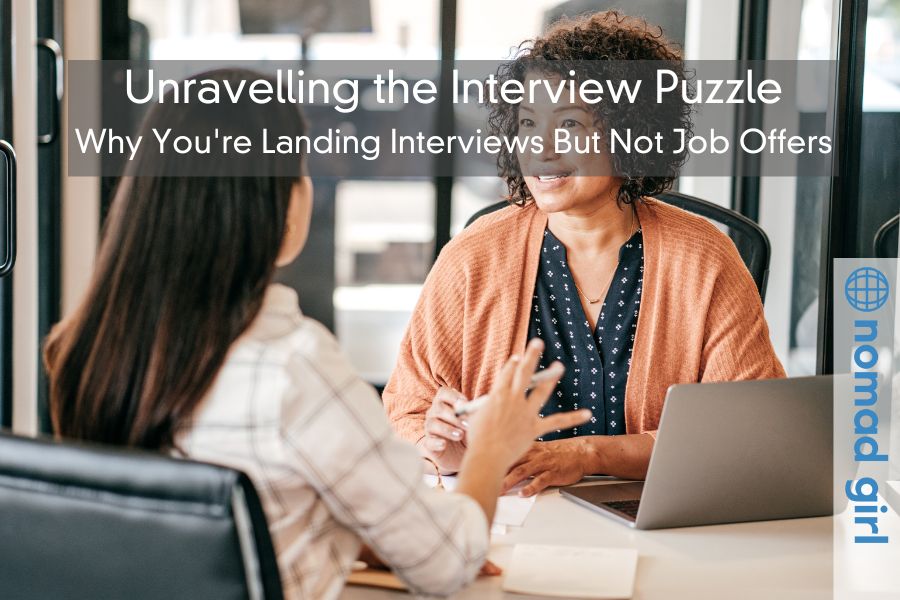A scenario many digital nomads know all too well: after pouring effort into tailoring your resume for that perfect remote job, securing an interview feels like a win, yet the job offer slips through your fingers. This cycle isn’t just exasperating; it prompts a deep dive into what might be missing. Often, the key lies in the nuances that extend beyond your skills and experiences. Let’s dive into some common reasons you’re getting interviews but no offers.
1. The Qualification Conundrum
The Qualification Conundrum explores the frequent mismatch between a candidate’s resume and an employer’s expectations. This disconnect may arise because a candidate is overqualified, underqualified, or possesses a different set of qualifications than those sought by the employer. To bridge this gap, it’s essential to customize your resume for each application, focusing on skills and experiences that closely match the job description. Such tailoring can significantly enhance your chances of resonating with potential employers, ensuring that your qualifications are viewed as an asset rather than a liability.
2. Homework on the Company – A Missed Step
Failing to adequately research a company before an interview can severely hinder your job prospects. Employers seek candidates who show a genuine interest and comprehensive understanding of the company’s mission, culture, and industry reputation. Equip yourself with thorough knowledge of the company’s history, its recent accomplishments, and the challenges it faces. Demonstrating such informed enthusiasm and articulating how your skills and experiences align with the company’s objectives can significantly enhance your appeal as a candidate. This proactive approach shows you’re not just looking for any job, but are specifically interested in contributing to their unique corporate journey.
3. Communication – More Than Just Words
How you convey your message holds equal weight to the content of the message itself. Struggling to find the right words, failing to maintain eye contact, or exhibiting poor listening skills can inadvertently convey disinterest or lack of confidence. To counteract this, diligent practice is key. Invest time in rehearsing your responses to common interview questions, ensuring that you can deliver them with assurance and poise. Additionally, focus on adopting positive body language, such as maintaining eye contact and sitting up straight, to reinforce your engagement and enthusiasm during the interview. This combination of preparedness and confident presentation can significantly influence the impression you leave on your interviewers.
4. Concrete Examples – Your Experience Showcase
Employers are not satisfied with ambiguous responses; they prefer concrete evidence of your skills in action. To meet this expectation, ready yourself with detailed anecdotes from your professional history, employing the STAR method (Situation, Task, Action, Result) to organize your answers. This approach allows you to present your experiences in a structured, impactful manner, demonstrating your capabilities through real-world applications.
5. The Cultural Fit Factor
Aligning with a company’s culture is equally vital as showcasing your professional expertise. It’s important to carefully assess your interactions throughout the interview process to guarantee that you’re not only promoting your technical abilities but also demonstrating your flexibility and alignment with the organization’s values. This dual focus can significantly enhance your candidacy by proving you’re a comprehensive fit both professionally and culturally.
6. The Money Talk – A Delicate Dance

Having misaligned expectations regarding salary and benefits can bring your job pursuit to an abrupt halt. It’s crucial to research and understand what constitutes a fair salary range for the position you’re applying for. Entering negotiations informed allows you to discuss compensation confidently. Moreover, maintaining flexibility in your salary expectations is key; being too rigid can risk you being deemed too expensive for the role. This preparation and adaptability can keep the door open for further discussions and potential job offers.
7. References – Your Silent Advocates
The individuals you select to serve as references can profoundly influence the outcome of your job application. It’s imperative to choose references who are not only dependable but also well-informed about the position you’re aiming for. Giving them a brief on the job specifics and explaining why you are a suitable candidate can equip them to offer more potent and pertinent recommendations. This proactive approach ensures that your references are prepared to highlight your strengths and suitability for the role effectively, thereby enhancing your prospects.
8. Post-Interview Etiquette – The Follow-Up
How you follow up after an interview can significantly underscore your interest in the position. Crafting a considerate thank-you note can serve as a subtle yet effective reminder of your enthusiasm, potentially keeping you in contention for the role. However, it’s crucial to strike the right balance in your follow-up efforts; being too persistent or aggressive can be off-putting. Moderation and tact are key, ensuring you remain memorable for the right reasons and maintain a positive impression with your potential employer.
9. It’s Not You, It’s Them – The Competition Factor
At times, the rationale behind not securing a position may have little to do with your own qualifications or performance. You could be competing against candidates who slightly surpass you in certain areas. Maintaining perspective is crucial in these instances. It’s vital not to internalize rejections but rather view them as valuable learning experiences. Each interview or application process offers insights and lessons that can enhance your approach and preparation for future opportunities. Embracing this mindset can help you navigate the job search process with resilience and a constructive outlook, continually refining your skills and strategies.
10. Managing Interview Nerves
Nervousness often stands as the most significant barrier to success in interviews. To overcome this, invest time in practicing calming strategies and engaging in mock interviews to bolster your self-assurance. It’s essential to remember that taking a moment to collect your thoughts before answering a question is not only acceptable but advisable. This preparation can significantly mitigate anxiety, allowing you to present your best self.
Understanding why job offers aren’t following your interviews is a journey in self-awareness and strategy refinement. Reflect on your interview experiences, seek feedback, and fine-tune your approach. Stay persistent and keep a positive outlook – the right job offer is often just around the corner.es


















